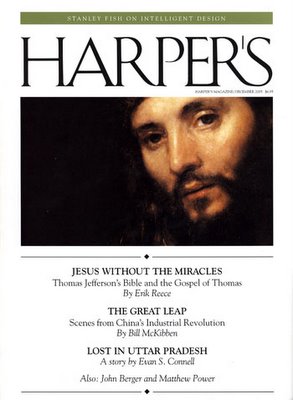 I've just had my spiritual inspiration for the week from an unexpected source: Harper's Magazine. The December issue contains two articles I can highly recommend.
I've just had my spiritual inspiration for the week from an unexpected source: Harper's Magazine. The December issue contains two articles I can highly recommend.
First is the cover story, "Jesus Without the Miracles," in which Eric Reese draws a fascinating parallel between Thomas Jefferson's Bible and the recently unearthed Gospel According to Thomas.
Jefferson, as a private amusement, literally took a pair of scissors to the Bible and over the course of "a few evenings" (amazing what there was time for before TV) extracted the actual teachings of Jesus from the encrustations of story and myth that grew up around them in later centuries. The result was something similar to the legendary source for the Gospels that was thought to have been lost. In it, according to Reese, "Jesus never performs a miracle and never claims that he will have to die for the sins of humankind." Instead we are left with the record of his teaching, a stream of exhortations for us to love one another, to do no harm, to "become as passers-by," to live gently on the earth.
Amazingly, even as Jefferson was working on his piece of clip-art, the actual source material was sleeping soundly in a clay jar beneath the sands of Egypt. When it was literally unearthed in the 20th century, after two thousand years, and the fragile scraps of papyrus were deciphered, the document revealed a remarkably similar teaching, full of parables and Zen koan-like puzzles, and equally devoid of any talk of miracles or salvation.
Right off the bat, for example, one of the first of these "sayings of Jesus" goes like this: "Let him who seeks continue seeking until he finds, and when he finds he will be troubled, and when he has been troubled he will marvel, and he will reign over the All." Heady stuff, seeming to describe the feelings of a modern reader trying to make sense of all this, as well as the condition of spiritual seekers of all ages, and pointing the way toward the eternal.
The companion piece in the same issue of Harper's is a wonderful memoir by Scott Korb titled "All That I Have is Yours," which is what his stepfather told him on his death bed, and also a quotation from the story of the prodigal son. That story is so well known it is easy to overlook its significance, but something about the immediacy of Korb's retelling brought it home to me in a new way.
As you may recall, the whole thing began with the younger son insisting on having his share of the inheritance right away, so his father obliged by dividing the estate and giving him half, which he promptly went away to squander. When he reappears later, destitute, the father not only welcomes him in great joy but throws him a big party and even kills the fatted calf in his honor. Seeing this, the elder brother says, "Um, excuse me, but I'm still here, I've never asked for anything, I've stayed by your side as a dutiful son, and now he comes back and you kill the fatted calf for him?"
The father replies that they have to celebrate their joy, that their son and brother who was as if dead has returned to them. But more than that, he reminds him, "everything I have is yours." In other words, you already have everything there is, what more could you want? In the larger context of the parable, in which God is the father, we are reminded that we already have everything there is, that we inherited it at birth--an entire world, a whole universe that grows in size and richness the more we learn of it--and that all we have to do in return is to share it with one another. What more could we want than everything there is?
The personal nature of this great gift appeals to the Quaker in me. It is something we all share simply by virtue of our humanity, with no need for salvation or the mediation of saints and priests on our behalf. Jesus was trying his best to tell us, "you're already saved, you already live in heaven, what more could you possibly want?" But, as he is also reported to have said, ruefully I suspect, "unless you see signs and wonders, you will not believe."
Personally, I think the survival of these words and the record of them is plenty in the way of miracles. And I'll be happy to take this day, this world, this one universe, as the plenty that it is, and say, "Thank you, thank you very much, this will do nicely."
Thursday, December 08, 2005
Signs and Wonders
Subscribe to:
Post Comments (Atom)









No comments:
Post a Comment